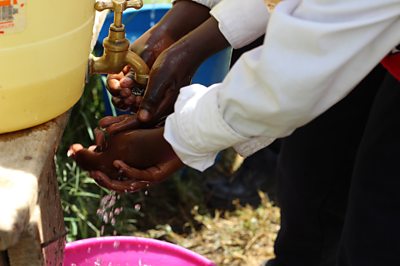Downloads
Publication date: June 2017
Context
There are many fragile settings within Kenya’s borders, including the environmentally and conflict-affected arid and semi-arid lands (ASALs) and the high-density slum areas of Nairobi. The country is currently facing one of the worst droughts in its history. In such a context, the SWIFT Consortium has been seeking to build on transformational change already underway in Kenya’s WASH sector, strengthening the likelihood of sustainability, expanding the resilience of communities and their WASH services and enhancing sectorial learning on the most effective approaches for ensuring sustained behaviour change and sustainable and resilient WASH in fragile and conflict-affected settings – all for the wider benefit of some of the world's most vulnerable populations.
The project
In 2015, Βι¶ΉΤΌΕΔ Media Action partnered with the SWIFT Consortium to implement a two-year-long WASH project in Kenya that aimed to deliver sustainable access to safe water and sanitation and to encourage the adoption of basic hygiene practices in different contexts. It specifically focused on target populations in the ASALs region (in Turkana, Marsabit and Wajir counties in northern Kenya) and in the informal settlements of Nairobi (Kawangware, Korogocho and Majengo).
As part of the consortium, Βι¶ΉΤΌΕΔ Media Action supported seven local radio stations across these target regions to produce and broadcast engaging and locally relevant programmes and public service announcements (PSAs). The overall objectives were to: enhance community awareness of good sanitation and hygiene practices, promote the adoption of these practices, and facilitate dialogue between citizens, civil society and the government on issues related to WASH.
Research approach
As part of the endline evaluation, Βι¶ΉΤΌΕΔ Media Action conducted a quantitative household survey of 2,785 adults (those aged 15 and above) in the target regions of Kenya. This took place in early 2017 and used face-to-face interviews. The evaluation also included qualitative work to gather stories of change and assess the success of capacity-strengthening activities with partner radio station staff.
Βι¶ΉΤΌΕΔ Media Action used regression analysis to establish the association between exposure to the WASH programmes and greater knowledge of and self-reported behaviour in relation to various WASH practices, while controlling for various environmental, social and demographic factors that might have affected the results.
Key findings
- Overall, the WASH outputs reached over 600,000 people (55% of the adult population in the target regions). This was double the project’s goal
- The radio programmes did particularly well at reaching those in the ASALs counties with the lowest purchasing power and with no schooling
Analysis that controlled for a number of other factors found that listeners were more likely than non-listeners to:
- Know the correct handwashing technique and be able to name important handwashing times
- Be aware that washing hands can prevent diarrhoea
- Report washing their hands at three or more critical times
- Agree that they would be ashamed if they did not wash their hands after using the toilet and be disgusted if others did the same
- Listeners were also more likely to be able to name at least three ways to make water safer to drink and to know that disposal of excreta in, or near, a water source can make it unsafe to drink
The programmes also helped to hold institutions to account around WASH:
- Listeners were more likely to agree that they have a role to play in asking authorities for better services and infrastructure than non-listeners
- Over two-thirds of listeners said that programmes played a role in holding those responsible for WASH services to account (67%) and said they increased discussion between communities and leaders (71%)
- Two-fifths of listeners (39%) felt the programmes had helped lead to improvements in WASH services and infrastructure in their areas
Implications
The findings suggest an important role for media communication in WASH interventions looking to ensure sustained behaviour change. Βι¶ΉΤΌΕΔ Media Action’s WASH programmes were able to reach large numbers of people in the target intervention areas – often remote and rural locations where access to health services and/or information on WASH was scarce.
The PSAs were particularly effective at conveying specific (often more nuanced) information, whereas the programmes helped to improve accountability around the provision of WASH infrastructure and services. This shows the importance of adapting content and formats to different communication needs.
The programmes also helped those with limited access to water to prioritise how to use it. At endline, access to water was not the barrier to implementing desired WASH practices that Βι¶ΉΤΌΕΔ Media Action had identified at the start of the project, suggesting that if they are tailored to contextual supply and infrastructure constraints, media and communication can support communities at scale.
